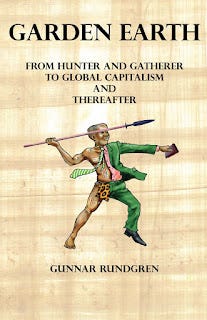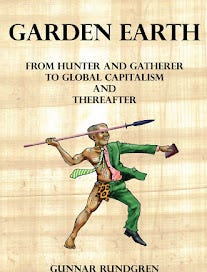Garden Earth - a regenerative society
The coming week I will launch the book Garden Earth at the Biofach fair in Germany. Below you find the final chapter of that book. In the final chapter I talk about Garden Earth which is my metaphor for a regenerative society. A regenerative society is a society that regenerates natural and social capital instead of squandering them.
The book is already available as a paperback and ebook at Amazon (see how to order here), and within a month or so it will also be in selected bookshops in the UK, Canada, USA, Australia and most internet bookshops around the world. It will also be available in Japanese by Dayosha.
Chapter 33: Garden Earth You may say that I’m a dreamer But I’m not the only one I hope someday you’ll join us And the world will live as one (John Lennon,‘Imagine,’ 1971)

The book Garden EarthHunters and gatherers lived in a wild nature, although they manipulated it more than most are aware. Their values, religion and society were shaped by their environment and ecological niche. A small fraction of the primary production of ecosystems was taken care of by human beings. With agriculture, it all changed. A part of nature, gradually growing, was occupied fully by the human species, cleared from undesired species and put directly, and uniquely, in our service. In this way, we maximized our share of the biological production, and favoured those species that produced what we needed. Because of more intensive use, buffers were smaller and agrarian society was thus vulnerable to disturbances and shocks, such as climatic events, disease of crops and animals as well as of ourselves. Soil erosion was an ever-present threat and a cause of societal collapses or simply slow decline. Our relationship changed not only with nature but also with each other and with the society that was established to manage this new system. Human society changed from a basically egalitarian society of small bands to agglomerations of authoritarian lordships, kingdoms and empires, and from a society with very limited division of labour to a stratified society where each had his or her well-defined role.
With the Industrial Revolution, based on fossil fuel, human control and reach expanded even more, to almost all nooks and corners of the globe. Humankind went further, climbed and flew higher, dived and dug deeper—all in the effort to find more resources to exploit. More and more parts of the living as well as the dead were put in direct service of humanity. Industrialism also brought new impetus to farming. The first stage brought tools and the power to extend the land under plough, but gradually also more and more machinery to increase productivity per labourer. This was stimulated by an increased use of fossil fuel so that farming from being a net producer of energy became a net consumer. Chemical fertilizers, extracted, manufactured and shipped from far away, were a step towards freeing agriculture from the limitations of the site, to manipulate life processes. These changes were also accompanied by increased use of pesticides and medicines. Now, when the rich supply of genes in nature doesn’t suffice, or there are natural barriers for combining them as desired, genetic manipulation is used.
At the same time as we are dependent on more and more of the bio-geosphere, people live lives increasingly more distanced from it. The warmth doesn’t come from wood that we cut in forests, but from distant power plants, district heating or oil and gas pumped from far away. We rarely touch the soil; the green plants most touch are retarded, tamed and flower-induced pot plants, if they are not plastic. We rarely feel the hot wind on our cheek, the rain in our hair or the bitter cold in our marrow. Still, we are more dependent on nature than ever before. Nature doesn’t care for humankind because it will survive well without it, but humankind has to care about nature.
Modern society has been successful in delivering personal wealth and economic growth, for a few people, that is. It has also broken down old prejudice and expanded human rights, freed people from bonded labour and other oppressive institutions. It has come a long way in ending discrimination of women and other groups often victimized, and been extremely successful in producing more things for the health, comfort and joy of human beings. The system, however, has not been successful in replacing the old system with a new one that gives people a feeling of meaning. Personal wealth and growth have become ends in themselves to such an extent that they remind of cancer.
The economic system and society have reached a critical limit through population explosion, unscrupulous and reckless exploitation of natural resources and constantly increasing energy use. For some resources, the limits have been passed already, which puts increasing pressure on societies, the global community of human beings and the foundations for human existence. We hunt for more and more things and satisfaction through consumption; the enormous choices haven’t made anyone happier. Unprecedented wealth is created, but it has not spread to most citizens of the world, despite everyone living in the same global economy. The gap between the rich and the poor is widening. Despite constant increased productivity leisure time doesn’t increase; contrarily, one’s leisure time and private sphere are invaded by the capitalist paradigm and behaviour patterns—to consume becomes a compulsion as strong as to work.
The capitalist system is a system of colonization, bent and suitable for geographical, physical and economic expansion. Society has now reached a stage of saturation; there is nothing left to colonize. The behaviours that were appropriate or at least acceptable for a species in rapid expansion are not the ones suitable for a life in balance. In some ways humanity seems to adapt to it—how else would one explain population ceasing to grow in developed countries? Organic farming, passive heating, electrical bicycles and solar energy represent technological developments better adapted to ‘householding’ societies with regenerative economics. The wild finds new ways of cohabiting with human beings and human beings find new ways of interacting with the wild. Cooperation within civil society has increased tremendously globally and is revived locally. There is a shift in values, where more and more people want to jump off the treadmill and seek that which gives ‘real’ well-being. This maturity is reinforced by the population ageing. The values of older people are adverse to risk and expansionism, and are more reflective and caring.
In the discussion about growth and limitations for human use of natural resources, it should not be forgotten that the poorest third of humanity needs to increase its use of natural resources, while the rest of humanity takes a break and enjoys life. This increased use is certainly not decoupled from direct exploitation of resources; it is the development of very real things such as electricity, houses, roads, water and sewage. Still, many old and new technologies can be deployed to make this growth less wasteful than previous modernization; these technologies include solar energy, distributed power, separation of water toilets from other water use, or buildings made from adobe, etc.
Most people have not yet realized the extent of the change required; humankind needs a completely new economy, a new society. Another society has to be built on values and conditions other than those of the capitalist society. It is a society oriented to closing gaps—gaps between people, between man and woman, between ruler and ruled, between ‘we’ and ‘them’, between one country and another and between man and nature. It is about unifying the many divisions that currently exist—division of labour, division between production and consumption, between work and leisure, between the individual and society, between economy and society and between beauty and efficiency.
As an alternative vision to the capitalist ideology I offer Garden Earth.
Where capitalism sees self-interest as the major human driver, Garden Earth is built on human needs satisfied in many ways and with voluntary cooperation.
Where capitalism is based on private property, the foundation for Garden Earth is stewardship of common resources.
Where capitalism sees nature as commons free to exploit, to mine and to use as a dumping ground, Garden Earth sees nature as our home.
Where capitalism sees specialization and division of labour as something very good, Garden Earth sees it as a potential evil, a risk that needs to be limited and its effects on individuals and society mitigated.
Where human energy in capitalism is used for salaried labour that a few profit from, in Garden Earth people work for their satisfaction and for doing something for the community.
Where technology in capitalism is developed and chosen to maximize some peoples’ profits, in Garden Earth it is selected to make life more enjoyable or transcend resource limitations.
We need each other and the existing form for our cooperation is what is called society or community. It is ruled by laws of nature, ecological conditions, human laws, norms inherent in our culture and values. The human being is part of society and vice versa. The well-being of humankind and society is intricately intertwined forever. Markets, the state, civil society and the private have roles to play in the future society. It is about expanding liberty and the notion of liberty to include also the capabilities of the individual and to resolve the false contradiction between the freedom of the individual and that of society.
We simply have to go back to the Garden of Eden. But we can no longer do so as the hunters and gatherers who were driven out. Humankind is no longer equal to the giraffe, the carrot or the sheep, even less to the stone. Man is part of nature; thus, the well-being of human beings and of other species is intertwined. Because of the numbers, intelligence and development of the human species, we have a special responsibility for the survival of other species and for the relative stability and productivity of the earth’s ecosystems.
Whether or not we like it, the survival of not only the human species but also many other species is in the hands of the human being.



